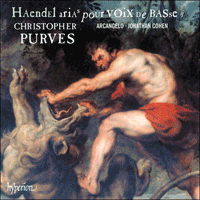Texte paru dans: / Appeared in: |
|
|
Outil de traduction ~ (Très approximatif) |
|
|
Reviewer: Bertil
van Boer It is well known that George Frédéric Handel liked to write for the bass voice (the alternative wording in the title of the disc, Finest Arias for Base Voice, is an 18th-century variant), and this release from Hyperion featuring bass Christopher Purves is a compendium of these greatest hits, though I miss the iconic “Ruddier than the cherry” from Acis and Galatea. The interesting thing about writing for this range by Handel is that he has a number of ways of handling the part (obvious pun intended), ranging from unison with the continuo strings or as a separate part all on its own with instrumentation that reflects its versatility. As one can see, the bulk of the work is drawn from the composer’s oratorios, where the requirements for vocal ranges according to character were less prescriptive. For instance, the moody, sorrowful lament by Haman in Ester has a lighter tessitura, S as befitting the smarmy overseer whose maleficent attempts to destroy the Jews have backfired. The floating line is abasing but lacks real contrition. The power of “See the raging flames arise” from Joshua has the fire rising in sparking coloratura, requiring a flexibility of vocal production to portray the doom of Jericho as the character, Caleb, exults over its demise. “Ah, canst thou but prove me” from Athalia represents Handel’s penchant for making the vocal line and bass continuo identical, giving power and decisiveness to the bottom registers. The plaintive “Vieni, o cara” from Rinaldo shows that he was aware of the tender power of the voice even in opera seria, with a sensitivity of line that expresses longing and emotion even in this earlier work. The final aria from Joshua with its rich textures and lyrical tone shows an equally tender side. Included is an insertion aria for the opera Catone by Nicola Porpora, with a delicate duet between a solo violin and bassoon in the introduction which then becomes a bit of lyrical counterpoint with the bass voice. The real treasure here, however, is the cantata Nell’africane selve, which pares everything down to a continuo and voice. Although the first aria has the bass and continuo weaving in and out from each other, the ranging line gives a broad overview of Handel’s ability to use every register of the voice effectively. The final aria is languid and quite lyrical, with an almost forward-looking musical style. Bass Christopher Purves clearly has a powerful and penetrating voice that fits Handel’s requirements perfectly. He is firm and resonant when needed, merges into the continuo when they are paired, and equites himself well in the sometimes wide-ranging and difficult passages. The musical forces of Arcangelo are well in tune, with good senses of how they ought to blend, and conductor Jonathan Cohen seems to know instinctively how to phrase this music. This is a fine disc of works centered around the bass voice, and though it doesn’t include some of the well-known favorites from his serenatas and oratorios, the selection demonstrates the depth and power of Handel’s writing for this range. Well worth exploring. | |
|
|
|
|
|
|
|
Cliquez l'un ou l'autre
bouton pour découvrir bien d'autres critiques de CD |
|




